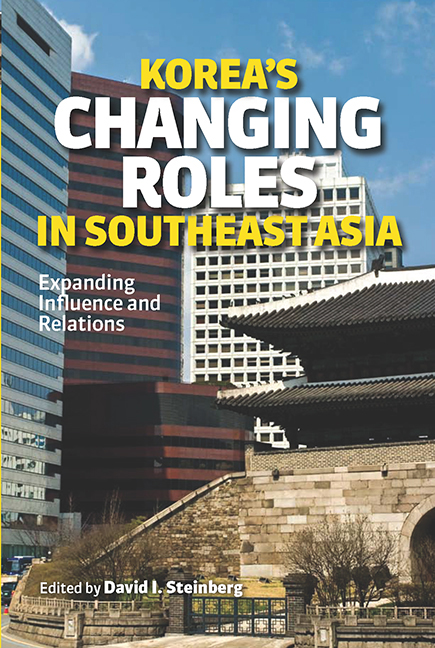Book contents
- Frontmatter
- Contents
- List of Tables, Figures and Photos
- Foreword
- Message
- Acknowledgements
- The Contributors
- 1 Tenuous Beginnings, Vigorous Developments
- 2 Perspectives on Korea's Role in ASEAN
- 3 South Korea and Southeast Asia: Ideas for Deepening the Partnership
- 4 Divergence Amidst Convergence: Assessing Southeast and Northeast Asian Security Dynamics
- 5 Korea's Economic Relations with Southeast Asia
- 6 Investment of Korean Electronics Industry in Southeast Asia
- 7 Korean Assistance to Southeast Asia
- 8 Korean Development Model: Lessons for Southeast Asia
- 9 Southeast Asian Migrant Workers in South Korea
- 10 Filipina Wives and “Multicultural” Families in Korea
- 11 A Fading Wave, Sinking Tide? A Southeast Asian Perspective on the Korean Wave
- 12 The Korean Wave: Korea's Soft Power in Southeast Asia
- 13 The Republic of Korea in Southeast Asia: Expanding Influences and Relations
- 14 Korea's Preparation for Southeast Asia: Research and Education on Southeast Asian Studies in Korea
- 15 Conclusion
- Index
14 - Korea's Preparation for Southeast Asia: Research and Education on Southeast Asian Studies in Korea
Published online by Cambridge University Press: 21 October 2015
- Frontmatter
- Contents
- List of Tables, Figures and Photos
- Foreword
- Message
- Acknowledgements
- The Contributors
- 1 Tenuous Beginnings, Vigorous Developments
- 2 Perspectives on Korea's Role in ASEAN
- 3 South Korea and Southeast Asia: Ideas for Deepening the Partnership
- 4 Divergence Amidst Convergence: Assessing Southeast and Northeast Asian Security Dynamics
- 5 Korea's Economic Relations with Southeast Asia
- 6 Investment of Korean Electronics Industry in Southeast Asia
- 7 Korean Assistance to Southeast Asia
- 8 Korean Development Model: Lessons for Southeast Asia
- 9 Southeast Asian Migrant Workers in South Korea
- 10 Filipina Wives and “Multicultural” Families in Korea
- 11 A Fading Wave, Sinking Tide? A Southeast Asian Perspective on the Korean Wave
- 12 The Korean Wave: Korea's Soft Power in Southeast Asia
- 13 The Republic of Korea in Southeast Asia: Expanding Influences and Relations
- 14 Korea's Preparation for Southeast Asia: Research and Education on Southeast Asian Studies in Korea
- 15 Conclusion
- Index
Summary
Introduction
Over the last two decades, particularly in East Asia, we have witnessed great change in everyday life as well as change in the socio-economic and natural environment. Under the banners of “globalization” and “regionalization”, not only commodities, factories, and money but also people, such as businessmen, students, scholars, tourists, and migrant workers, cross national borders. This new trend of people-to-people exchange is so extensive that Korea, once regarded as one of the most homogenous nations in terms of ethnic composition, is now entering an era of being a multi-ethnic and multicultural nation.
Southeast Asia plays a greater role than any other region in the transformation process that Korea is currently undergoing. As of September 2007, more than one million foreigners resided in Korea, with Southeast Asian countries contributing approximately one-fifth of that number. The number of foreign migrant workers is reportedly 400,000, of which more than 30 per cent are Southeast Asian workers (Immigration Bureau 2007). It is expected that these numbers will increase as Korea is one of the world's fastest-ageing societies. This change in Korea's demographic structure will lead to a demand for an economically active population, which will probably come from foreign countries and, in particular, from Southeast Asia.
As a consequence, Korea will become over the next two or three decades a nation that feels most keenly the impact of “globalization and regionalization”. Southeast Asia, as the neighbouring region, will play an important role in the process of change. In this regard, more attention needs to be paid to how and to what extent Korea is preparing for change. This study forms part of the project to answer this question. First, it attempts to examine what Korean researchers who specialize in the study of Southeast Asia are doing and have done as part of their research. In particular, researchers' socio-demographic characteristics, academic backgrounds, research interests, and research activities will be examined. The study also attempts to investigate the current situation, at the tertiary level, of Korean education about Southeast Asia. It focuses on how well Korean universities prepare their programmes and curricula in Southeast Asian studies and language education. The postgraduate careers of the college students who have been trained in this programme are then analysed.
- Type
- Chapter
- Information
- Korea's Changing Roles in Southeast AsiaExpanding Influence and Relations, pp. 325 - 354Publisher: ISEAS–Yusof Ishak InstitutePrint publication year: 2010

